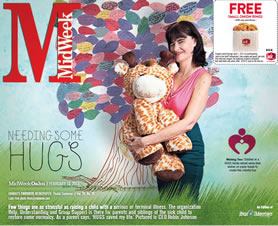Needing Some Hugs
Few things are as stressful as raising a child with a serious or terminal illness. The organization Help, Understanding and Group Support is there for parents and siblings of the sick child to restore some normalcy. As a parent says, ‘HUGS saved my life.’ (Cover Pictured is CEO Robin Johnson. Wishing Tree: Children at a HUGS family retreat wrote their wishes on paper leaves to create this colorful tree)
cover_3
A hug is said to be two hearts wrapped in arms. A hug is one of the most basic ways two human beings touch in the simple act of caring and kindness.
A local organization has “bottled” the essence of an embrace and made it into a model program that is unique in the nation. This innovative enterprise, appropriately enough, is based in the land of aloha.
The organization is HUGS, whose acronym stands for Help, Understanding and Group Support. Founded in 1982, the nonprofit agency provides services for families coping with the stresses of having a child with a serious or terminal illness.
Taking care of a chronically ill child is considered one of the most draining and difficult tasks a parent can face.
Beyond handling physical challenges and medical needs, there’s dealing with the emotional needs of the child and the impact that prolonged illness can have on the entire family.
This tough balancing act doesn’t have to be done alone, according to HUGS, which lends a helping hand through support groups, social workers and family friends.
The HUGS House, as its gathering place is known, is located at 3636 Kilauea Ave. in Kaimuki, across from Diamond Head Health Center. The lovely eight-room house in a quiet neighborhood was once occupied by pediatrician Cecil A. Saunders, who established
Honolulu’s first baby clinics in the 1920s.
“It has good karma,” a visitor once observed.
At this historic site, families gather for support sessions, monthly social activities and valued respite breaks.
It also is where we meet Robin R. Johnson, HUGS’s first chief executive officer who started her duties last March. A consultant to philanthropies and nonprofit service providers, she oversees strategic planning, administration, resource development and communications for HUGS.
Following a tour of the house and outdoor recreational area, complete with a Hale O Keiki playhouse, we sit on a sunny front porch to get our arms around the HUGS story.
“Families with seriously ill children are burdened with so many challenges and stressors to overcome,” Johnson explains. “The population as a whole is at extreme risk. Not only do these families experience unusually high divorce rates, but they also are constantly challenged financially, spiritually, emotionally and by a myriad of other issues related to their child’s condition.
“We strive to keep the family together in the face of overwhelming adversity,” she says. “HUGS is not a bereavement group. HUGS is a joy-centered place where there is always a lot of fun and family-oriented activities going on.”
As anyone who’s been a caregiver knows, often the heaviest burdens, both physically and psychologically, fall to the patient’s dependents. While health care professionals are addressing the patient’s needs, who is ensuring that the caregiver stays strong and able in the process?
HUGS, in a holistic approach, has its eye on the people around the patient who must endure. It is poetic irony when those around the sick child say, “HUGS saved my life.”
“They (children) know what life is all about, more than we adults. They teach us what’s important in life,” says Tom Fisher, HUGS volunteer for 30 years.
“HUGS is truly a family that helps people to stay strong, to be a shoulder to cry on. There is no other organization like it,” offers Rick Maldonado, HUGS father since 1994.
“When we come to HUGS, that’s really the only time when we feel normal … we are comfortable to come as we are and not be stared at or judged,” says Catha Combs, HUGS mother since 1996 and current HUGS board secretary.
Siblings of sick individuals also get HUGS attention. At a recent siblings camp, children penned messages for a Wishing Tree. A number wished for a “normal” family and home life, inferring that daily stressors had become the new norm.
Yet siblings witnessing the miraculous work of HUGS are often the first to volunteer to help other families. They are soothing voices of compassion and counsel to others.







